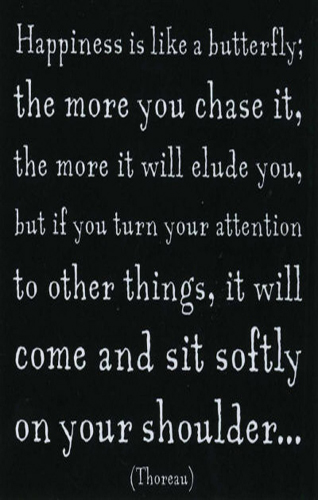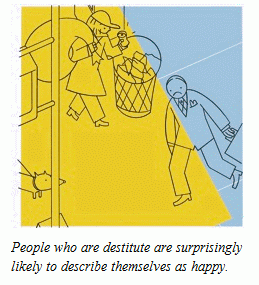 |
| Image above: courtesy, Paul Bo |
In 1978, a trio of psychologists curious about happiness assembled two groups of subjects. In the first were winners of the Illinois state lottery. These men and women had received jackpots of between fifty thousand and a million dollars. In the second group were victims of devastating accidents. Some had been left paralyzed from the waist down. For the others, paralysis started at the neck.
The researchers asked the members of both groups a battery of questions about their lives. On a scale of "the best and worst things that could happen," how did the members of the first group rank becoming rich and the second wheelchair-bound? How happy had they been before these events? How about now? How happy did they expect to be in a couple of years? How much pleasure did they take in daily experiences such as talking with a friend, hearing a joke, or reading a magazine? (The lottery winners were also asked how much they enjoyed buying clothes, a question that was omitted in the case of the quadriplegics.)
For a control, the psychologists assembled a third group, made up of Illinois residents selected at random from the phone book.
When the psychologists tabulated the answers, they found that the lottery group rated winning as a highly positive experience and the accident group ranked victimhood as a negative one. Clearly, the winners realized that they'd been fortunate. But this only made the subsequent results more puzzling.
The winners considered themselves no happier at the time of the interviews than the members of the control group did. In the future, the winners expected to become slightly happier, but, once again, no more so than the control-group members. (Even the accident victims expected to be happier than the lottery winners within a few years.) Meanwhile, the winners took significantly less pleasure in daily activities - including clothes-buying-than the members of the other two groups.
Perhaps, the psychologists hypothesized, people who buy lottery tickets tend to be melancholy to begin with, and this had skewed the results. They randomly selected another group of Illinoisans, some of whom had bought lottery tickets in the past and some of whom hadn't. The buyers and the non-buyers exhibited no significant affective differences. The members of this new panel, too, rated themselves just as happy as the lottery winners, and reported getting more pleasure from their daily lives.
The researchers wrote up their findings on the lottery winners and the accident victims in the Journal of Personality and Social Psychology. The paper is now considered one of the founding texts of happiness studies, a field that has yielded some surprisingly morose results. It's not just hitting the jackpot that fails to lift spirits; a whole range of activities that people tend to think will make them happy - getting a raise, moving to California, having kids - do not, it turns out, have that effect. (Studies have shown that women find caring for their children less pleasurable than napping or jogging and only slightly more satisfying than doing the dishes.)
As the happiness researchers, Tim Wilson and Daniel Gilbert, have put it, "People routinely mispredict how much pleasure or displeasure future events will bring."
What should we do with information like this?
On an individual level, it's possible to stop buying lottery tickets, move back to Minnesota, and, provided the news reaches you in time, have your tubes tied. But there are more far-reaching societal implications to consider. Or so Derek Bok argues in his new book, "The Politics of Happiness: What Government Can Learn from the New Research on Well-Being" (Princeton; $24.95).
Bok, who served two stints as president of Harvard, begins with a discussion of prosperity and its discontents. Over the past three and a half decades, real per-capita income in the United States has risen from just over seventeen thousand dollars to almost twenty-seven thousand dollars. During that same period, the average new home in the U.S. grew in size by almost fifty per cent; the number of cars in the country increased by more than a hundred and twenty million; the proportion of families owning personal computers rose from zero to seventy per cent; and so on.
Yet, since the early seventies, the percentage of Americans who describe themselves as either "very happy" or "pretty happy" has remained virtually unchanged. Indeed, the average level of self-reported happiness, or "subjective well-being," appears to have been flat going all the way back to the nineteen-fifties, when real per-capita income was less than half what it is today.
Several theories have been offered to explain why the United States is, in effect, a nation of joyless lottery winners. One, the so-called "hedonic treadmill" hypothesis, holds that people rapidly adjust to improved situations; thus, as soon as they acquire some new delight - a second house, a third car, a fourth-generation iPhone - their expectations ramp upward, and they are left no happier than before. Another is that people are relativists; they are interested not so much in having more stuff as in having more than those around them. Hence, if Jack and Joe both blow their year-end bonuses on Maseratis, nothing has really changed and neither is any more satisfied.America's felicific stagnation shouldn't be ignored, Bok argues, whatever the explanation. Growth, after all, has its costs, and often quite substantial ones. If "rising incomes have failed to make Americans happier over the last fifty years," he writes, "what is the point of working such long hours and risking environmental disaster in order to keep on doubling and redoubling our Gross Domestic Product?"
 To suggest that the U.S. abandon economic growth as a policy goal is a fairly far-reaching proposal. Bok concedes as much - "The implications of this critique are profound" - but he insists that all he's doing is attending to the data. He takes a similarly provocative and, again, empirically driven position in a chapter titled "What to Do About Inequality." His answer is, in a word, "Nothing."
To suggest that the U.S. abandon economic growth as a policy goal is a fairly far-reaching proposal. Bok concedes as much - "The implications of this critique are profound" - but he insists that all he's doing is attending to the data. He takes a similarly provocative and, again, empirically driven position in a chapter titled "What to Do About Inequality." His answer is, in a word, "Nothing."
It's true, Bok acknowledges, that rich Americans tend, on average, to be happier than poor ones. It's also true that the incomes of the country's top earners have, in recent decades, grown several times as fast as those of the earners at the bottom. But the statistics show that, over the past few decades, the subjective well-being of those at the bottom has remained unchanged. If the poor aren't bothered by the growing disparity, Bok asks, why should anyone else be?
"The most obvious reason for deploring income inequality is our instinctive sympathy for those who must make do with many fewer goods and services," he observes. "It is not immediately clear, however, why growing inequality should elicit such compassion if lower-income Americans themselves have not become less happy."
After scratching growth and income redistribution off his list, Bok goes on to discuss measures that, the evidence suggests, would increase aggregate happiness. Job loss, he points out, has been shown to be singularly upsetting. According to one frequently cited study, as a downer it outranks divorce or separation. Even when workers find a new position at similar pay, they often fail to regain their earlier level of happiness.
But the U.S., according to Bok, does "less than virtually any other advanced industrial nation to cushion the shock of unemployment."
Surely, there is room here for improvement. Bok recommends that unemployment insurance be extended to the fifty per cent (or more) of American workers who are not now covered, and that aid be offered to those who lose their jobs and want to go back to school.
Chronic pain is another source of misery that could be ameliorated by better policy. Current regulations on painkillers, which are aimed at keeping drugs like Oxycontin out of the hands of addicts, have the unfortunate effect of also keeping them away from cancer victims. Depression, too, is often inadequately treated; Bok cites research that suggests that only one out of every six seriously depressed Americans receives the proper care.
"It is not unreasonable to expect the government to... provide some simple way to help the mentally ill cope with the confusing array of health care options and agencies and guide them to appropriate treatment," he writes. "Nor is it impossible to create a health care system that covers all of the mentally ill."
Bok's recommendations continue in this vein-better treatment of sleep disorders, more recreational sports programs for kids, improved civics classes. (Research shows that people who participate in political activities such as voting are happier than those who don't.) The measures may strike readers as inadequate to the task of increasing gross national happiness. But that, it could be argued, only proves Bok's point: "People do not always know what will give them lasting satisfaction."

As in the United States, she notes, the rich in any given country tend to be happier than the less affluent. But, once again, the relationship between money and well-being turns out to be a lot less straightforward than is generally assumed.
Take the case of Nigeria. The country's per-capita G.D.P. last year was about fourteen hundred dollars. (In real terms, this is significantly lower than it was when the nation declared its independence, in 1960.) Yet the proportion of Nigerians who rate themselves happy is as high as the proportion of Japanese, whose per-capita G.D.P. is almost twenty-five times as great.
The percentage of Bangladeshis who report themselves satisfied is twice as high as the percentage of Russians, though Russians are more than four times as rich, and the proportion of happy Panamanians is twice as high as that of happy Argentines, though the Argentines have double the income.
Research that Graham has done in Afghanistan shows that, despite three decades of war and widespread destitution, Afghans are, on average, a pretty cheerful lot. (The most cheerful areas of the country tend to be those in which the Taliban's influence is stronger.) Graham's research in Latin America shows that the very poor are often remarkably upbeat.
"Higher per capita income levels do not translate directly into higher average happiness levels," she writes.
Graham entertains several possible explanations for "the paradox of the happy peasant," a phrase of her own invention. One is founded on genetics. Research on twins suggests that some people are hard-wired to be glad and others to be dejected. Perhaps the poor, she proposes, have happy DNA. Or, conversely, perhaps people who are, by nature, malcontents tend to strive more. As a consequence, they make more money, and so the naturally happy end up being disproportionately penniless.
 A third (and probably more plausible) alternative is that it's a matter of conditioning; just as people adjust to winning a million dollars, so, too, they adjust to living on a dollar a day. "There is evidence of a great deal of upward and downward adaptation," Graham observes.
A third (and probably more plausible) alternative is that it's a matter of conditioning; just as people adjust to winning a million dollars, so, too, they adjust to living on a dollar a day. "There is evidence of a great deal of upward and downward adaptation," Graham observes.
Like Bok, Graham argues that policymakers ought to take happiness studies more seriously. Indeed, the whole premise of her book is that the research has practical applications. But she's reluctant to suggest what those applications might be.
Should the very poor be left to enjoy their relative contentment? Graham clearly appreciates the awkwardness of this argument; she quotes the Nobel Prize-winning economist Amartya Sen, who has observed, "The grumbling rich man may well be less happy than the contented peasant, but he does have a higher standard of living." At the same time, she notes, there doesn't seem much to be gained from trying to convince the "happy peasant" that, really, he ought to be miserable. The implications "for policy are very unclear," she writes, which may be a roundabout way of saying that the implications of her work make her unhappy.
In the best-selling book, "Stumbling on Happiness" (2006), Daniel Gilbert, a psychology professor at Harvard, offers a catalogue of the ways that people misjudge their own satisfactions.
They tend to think that they'll be happier with more variety, when, in fact, they get more pleasure from being offered the same thing over and over again. They are willing to pay a premium to preserve their options, but they're more contented when they commit themselves to a particular choice. They anticipate being overjoyed by events that, when they actually occur, leave them unmoved.
A study illustrating this last point was conducted in the aftermath of the November 7, 2000, election. On November 8th, researchers asked voters from both parties to predict how happy (or unhappy) they would be when either Al Gore or George W. Bush was declared the winner. On December 13th, Gore conceded to Bush, and the day after that the researchers asked the voters how they felt. The Bush voters were only about a third as happy as they had expected to be. Conversely, the Gore voters were only about a fourth as disappointed.
Finally, on April 1, 2001, the researchers asked the voters to recall how they had felt back in December. Interestingly, both sets of voters remembered themselves as having been just as happy-or sad-as they had initially predicted they would be in November. (The actual experience of winning-or losing-apparently made less of an impression on them than the anticipated one.)
 If happiness research simply confirmed what people already believed, there would be no need, and really no reason, to argue for its relevance. It's the counterintuitive cast of the results that makes the work provocative and "the politics of happiness" worth thinking about. As the studies make clear, the same sorts of mistakes that individuals are prone to are widely replicated on a national level. People place their hopes on higher incomes, countries on higher G.D.P., and both end up disappointed. (Indeed, according to Graham, rapid economic expansion is just as likely to reduce happiness as the reverse, a situation that she refers to as "the paradox of unhappy growth.")
If happiness research simply confirmed what people already believed, there would be no need, and really no reason, to argue for its relevance. It's the counterintuitive cast of the results that makes the work provocative and "the politics of happiness" worth thinking about. As the studies make clear, the same sorts of mistakes that individuals are prone to are widely replicated on a national level. People place their hopes on higher incomes, countries on higher G.D.P., and both end up disappointed. (Indeed, according to Graham, rapid economic expansion is just as likely to reduce happiness as the reverse, a situation that she refers to as "the paradox of unhappy growth.")
The idea that happiness research should at least be considered by policymakers is, increasingly, a mainstream position.
Two years ago, the President of France, Nicolas Sarkozy, appointed a commission to look into ways to improve the measurement of government performance. When the commission, headed by Amartya Sen and another Nobel Prize-winning economist, Joseph Stiglitz, issued its final report, last fall, it was critical of the current reliance on G.D.P., which, it argued, is a poor proxy for social progress:
"For example, traffic jams may increase G.D.P. as a result of the increased use of gasoline, but obviously not the quality of life." The group recommended that a wide variety of new statistical tools be developed, including ones that measure income distribution, natural-resource depletion, and happiness.
"Statistical offices should incorporate questions to capture people's life evaluations, hedonic experiences and priorities," the report concludes. "Research has shown that it is possible to collect meaningful and reliable data on subjective as well as objective well-being."
Strict happiness advocates take things quite a bit further. Bok, for his part, argues that lawmakers should act on the findings of happiness research, even when doing so goes against the wishes of their constituents. "Most voters would probably prefer to be happy rather than have their representative mechanically accept their mistaken impressions of how to reach this goal," he writes.
But even if it were possible-and the political challenges are far from trivial - the limits of such a rigorously "hedonomical" approach seem pretty obvious. As a long line of moral philosophers have noted, there's more to life than subjective well-being.
("It is better to be a human being dissatisfied than a pig satisfied; better to be Socrates dissatisfied than a fool satisfied" is John Stuart Mill's famous formulation.)
And happiness, at least as it's defined by happiness studies, offers little guidance on many of the choices that matter most.
Consider again the finding that a half century of escalating consumption has not brought Americans increased satisfaction. This is a disturbing fact, and certainly one that seems pertinent to discussions of economic policy.
But let's imagine, for a moment, that we had enjoyed ourselves for the past fifty years. Surely, trashing the planet is just as wrong if people take pleasure in the process as it is if they don't. The same holds true for leaving future generations in hock and for exploiting the poor and for shrugging off inequality.
Happiness is a good thing; it's just not the only thing.
[Courtesy: The New Yorker]

